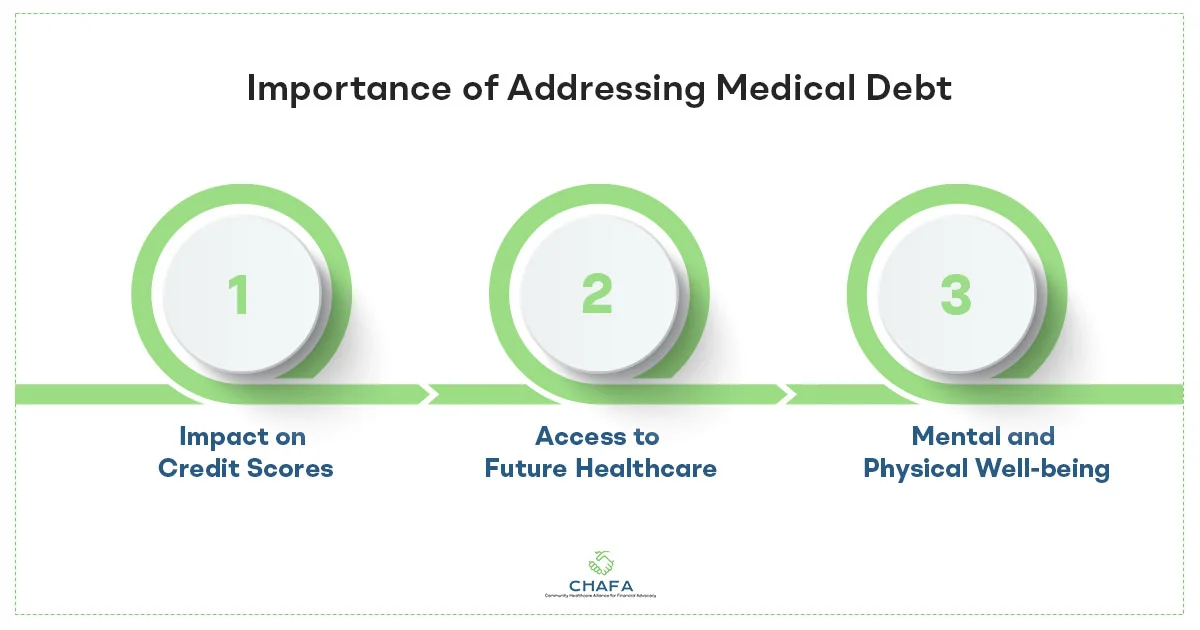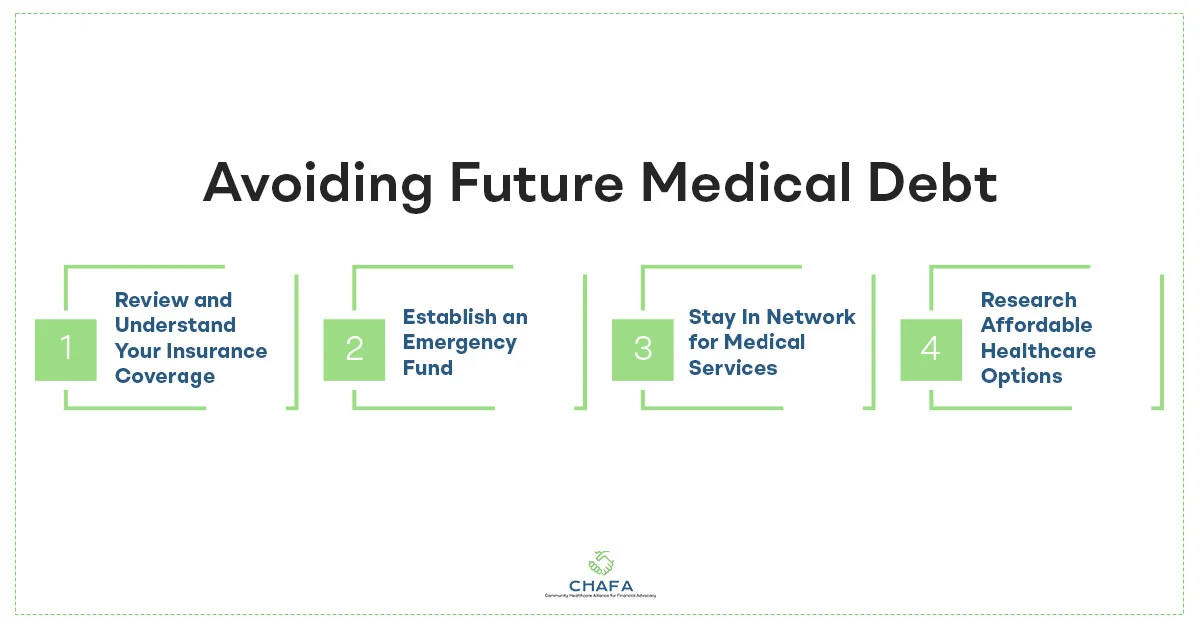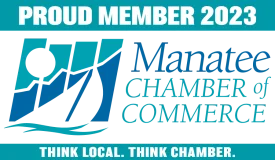
One issue that many Americans encounter in the complex world of healthcare is the weight of medical debt. Unexpected medical bills can quickly add up, leaving people and families scrambling to make ends meet.
Research has shown that Americans owe at least $140 billion in outstanding medical debt, collectively. The major causes behind this debt are mainly a lack of insurance and an increasing healthcare cost.
Importance of Addressing Medical Debt
Medical debt is an issue of concern for many people across the United States. According to a Kaiser Family Foundation survey, around 67% of people battling with medical debt had insurance, illustrating the pervasiveness of this issue.

To keep medical debt from spiraling out of control, it’s critical to address it as soon as possible.
1) Impact on Credit Scores
The potential influence on credit ratings is one of the key reasons to manage medical debt. Unpaid medical bills may be reported to credit bureaus, lowering your credit score and making it difficult to obtain loans or credit in the future.
In extreme situations, it may even result in legal action.
2) Access to Future Healthcare
Ignoring medical debts could potentially jeopardize your future access to treatment and healthcare services. Some healthcare providers may reject treatment or limit services until unpaid fees are compensated in full.
Addressing medical debt ensures that you keep a strong relationship with your healthcare providers and that you have unrestricted access to necessary medical care.
3) Mental and Physical Well-being
The stress of increasing medical debt can have serious consequences for one’s mental and physical health. To reduce the stress on your entire well-being, it is important to prioritize your health and make proactive efforts to resolve medical debt.
Exploring Payment Plans
Negotiating medical expenses and creating affordable payment schedules are effective ways to regain financial control. Many healthcare practitioners recognize the financial difficulties that patients experience and are eager to work with them to find reasonable solutions.
1) Initiating Communication
The first step in investigating payment options is to contact your healthcare provider. Contact their billing department to explain your position and express your eagerness to pay.
For those experiencing financial trouble, several providers provide financial assistance programs or flexible payment choices.
2) Negotiating Medical Bills
Medical bill negotiation is a regular practice that can result in significant reductions. Request an itemized bill and thoroughly analyze it for any errors or anomalies. If you discover any, notify your healthcare practitioner and work towards a fair resolution.
In addition, inquire about discounts for quick payment or the establishment of a payment plan.
3) Financial Assistance Programs
Investigate the financial support programs provided by hospitals and healthcare providers. These programs are intended to assist people with low incomes or excessive medical bills. Because eligibility criteria differ, it’s critical to learn about these programs and apply if you fulfill the requirements.
Tips for Managing Medical Debt
Effectively managing medical debt requires a proactive approach and careful financial planning.
The following tips can help you navigate through the challenges associated with medical bills.
- Prioritize your medical bills based on urgency and interest rates.
- Create a budget that allocates a portion of your income to cover medical expenses.
- Debt consolidation is an option to streamline multiple debts into a single, more manageable payment. Consider consolidating medical debts with a lower interest rate loan, but be cautious and conduct thorough research before committing to any financial arrangement.
- If you have an HSA or FSA, use these accounts to cover eligible medical expenses and reduce the financial strain of out-of-pocket medical costs.
- Explore government assistance programs like Medicaid and the Children’s Health Insurance Program (CHIP) that provide health coverage to eligible individuals and families with low income.
Seeking Legal Assistance
When faced with a mountain of medical debt, seeking legal counsel seems like the most realistic choice.
Legal specialists who specialize in healthcare and debt difficulties can provide advice and investigate viable solutions. This is where CHAFA comes into the picture and helps you in the battle of medical expenses.
Before seeking legal counsel, it is important to understand your consumer rights. Learn about the Fair Debt Collection Practises Act (FDCPA) and other consumer protection legislation.
An experienced attorney can provide valuable insights into your legal options, including debt settlement, bankruptcy, or even negotiating with creditors on your behalf.
Legal professionals can sometimes negotiate with healthcare providers or collection agencies to settle debts for a lower amount. This can bring relief and help you to settle outstanding medical costs while minimizing financial consequences.
Avoiding Future Medical Debt
Preventing future medical debt involves a combination of proactive measures and strategic financial planning.
By implementing the following strategies, you can safeguard your financial well-being and reduce the risk of accumulating additional medical expenses.

1) Review and Understand Your Insurance Coverage
Regularly review your health insurance coverage to ensure it meets your needs. Understand the terms and conditions, including deductibles, copayments, and coverage limits.
2) Establish an Emergency Fund
Building an emergency fund is an important aspect of financial planning. Having a reserve of funds specifically designated for unexpected medical expenses can provide a financial safety net. It also reduces the need to rely on credit cards or loans in times of crisis.
3) Stay In-Network for Medical Services
Whenever possible, seek medical services from providers within your insurance network. In-network providers typically have negotiated lower rates with insurance companies.
4) Research Affordable Healthcare Options
Explore affordable healthcare options, such as community clinics, federally qualified health centers, and charitable organizations that provide medical services at reduced or no cost.
Managing medical debt is a complicated task that necessitates a combination of communication, negotiation, financial planning, and, in some situations, legal representation. Remember that there are resources and people available to assist you in navigating the complexity of medical debt, so don’t be afraid to seek help when you need it. Contact CHAFA to learn more about navigating medical bills.

